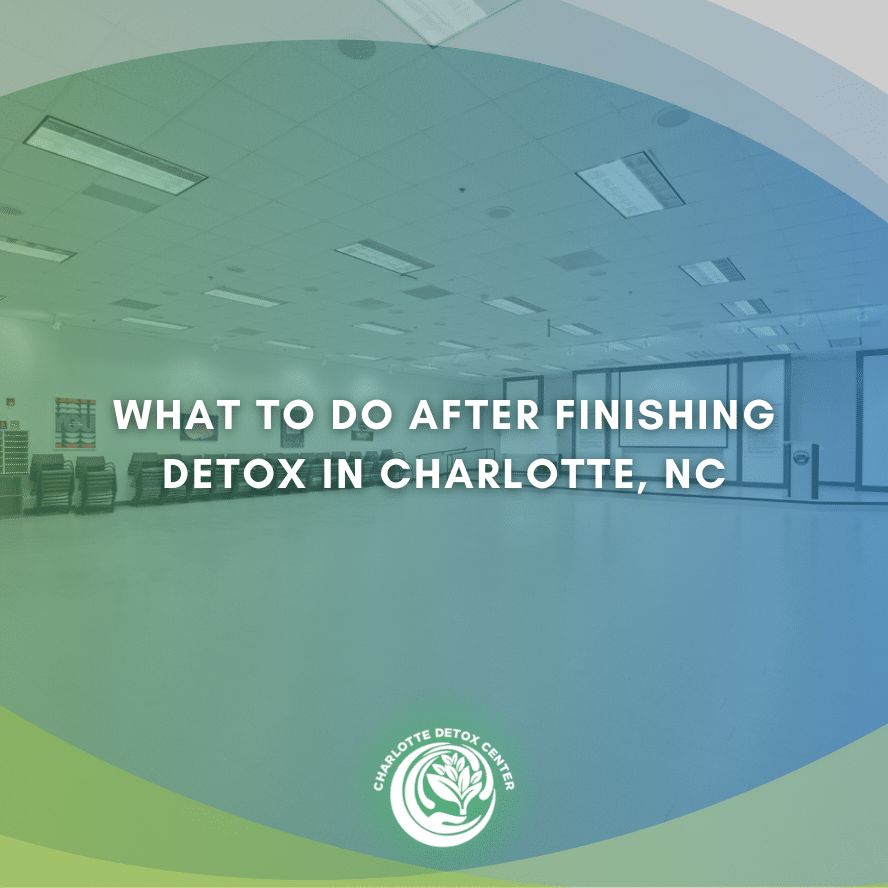What To Do After Finishing Detox in Charlotte, NC

Medically Verified: 2/1/24
Medical Reviewer
Chief Editor

All of the information on this page has been reviewed and verified by a certified addiction professional.
Completing a Charlotte detox program is only the first step of recovery. After finishing detox, you should enroll in an addiction treatment program that can address your unique needs and help you stay sober after detox. However, everyone is different, and the type of care you need may be different from the person in the room next to you at the detox center.
Before you leave a drug and alcohol detox center in Charlotte, you will meet with a substance abuse counselor to discuss your medical history, drug and alcohol use, and more. This counselor will help you determine what level of care you need, what your insurance will cover, and what your next steps should be. Here’s what you should do after finishing detox in Charlotte, NC.
Comprehensive Addiction Treatment After Detox
There is no ultimate cure for addiction, and detox only addresses the earliest physical symptoms of withdrawal. Even after you finish a detox program, you may have lingering symptoms in the form of post-acute withdrawal (PAWS), intense cravings for drugs or alcohol, and mood swings that are difficult to control. All of these obstacles can lead you back to substance use if you don’t seek additional help after finishing detox.
The best way to stay sober after detox is to participate in a comprehensive addiction treatment program. It is best to find a program that offers individualized programs tailored to your specific needs. A good treatment program will also use evidence-based therapies and utilize the latest medical and scientific research to provide you the best possible care.
There will be a range of different rehab programs available to you after you leave detox. As far as levels of care go, you will likely choose between inpatient or outpatient rehab. An inpatient program will be more intensive with around-the-clock care and support, while an outpatient program is best for people with mild addictions who do not need 24/7 supervision.
Your inpatient or outpatient rehab program may last anywhere from 30-90 days. After you complete treatment, you will work with your therapist to develop an aftercare plan to support long-term sobriety.
Individual and Group Counseling
Both inpatient, outpatient, and aftercare programs will utilize group and individual therapy in the treatment process. These therapy sessions may include several different approaches and treatment styles.
Some of the most popular treatment therapies used on people after finishing drug and alcohol detox in Charlotte, NC include:
- Cognitive Behavioral Therapy (CBT) – CBT is the most popular type of substance use disorder therapy. It focuses on identifying negative thoughts, working through emotions, replacing negative behaviors with positive ones, and learning how to cope with and adjust dysfunctional beliefs.
- Medication-Assisted Treatment (MAT) – MAT may be offered to you if you are addicted to alcohol or opioids. This approach combines traditional therapies and support groups with FDA-approved medications that help reduce withdrawal symptoms and cravings.
- Holistic Therapy – This refers to a variety of different therapies, including yoga, meditation, art, music, martial arts, and much more. These complementary interventions can help provide a “whole-patient” approach when used in combination with other treatment methods after detox.
- Family Therapy – Family support and involvement is a key component to the recovery process for many people. After you complete detox, part of your treatment program may involve working with family members to improve communication and work out difficult issues.
- Relapse Prevention – If you aren’t prepared with practical relapse prevention strategies, you may not be able to stay sober. Relapse prevention therapy aims to focus on identifying triggers and coming up with a relapse prevention plan to help you stay sober.
Ongoing Care After Detox and Treatment
A 30, 60, or 90-day stay in a North Carolina rehab facility likely won’t be enough to keep you sober forever. Instead, you’ll need to continue treating your addiction and participating in your recovery on a regular basis after finishing detox.
Examples of aftercare or ongoing care programs that can help protect your sobriety after treatment and detox include:
- Sober living homes
- 12-Step groups
- SMART Recovery
- Celebrate recovery
- Church groups
- Alumni groups
- Individual counseling
- Medication management
There are many different paths towards sobriety, so your recovery may look different from someone else’s. The details about which type of aftercare is right for you should be outlined in your aftercare plan.
More Tips on Staying Sober After Drug and Alcohol Detox
In addition to completing an addiction treatment program and participating in aftercare, there are many healthy activities and lifestyle changes you can take advantage of to stay sober. Some of these include:
- Getting a sponsor and working the 12-steps with him or her
- Maintaining a healthy lifestyle with plenty of sleep, exercise, and a balanced diet
- Find ways to reduce stress like yoga, meditation, or exercise
- Develop a sober support group
- Attend all of your meetings and counseling sessions
- Separate yourself from people who do not support your recovery
- Never be afraid to reach out for additional help
Find The Help You Deserve After Finishing Detox
Whether you are still actively using drugs and alcohol and need to find a local detox center or you have already completed detox and are wondering what your next steps should be, we’re here to help. Pick up the phone and call one of our dedicated treatment professionals today.
